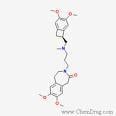
September 3, 2009 – Important new findings in patients with angina participating in the BEAUTIFUL study show that there is a 42 percent reduction in heart attack with Procoralan (ivabradine), as presented today at the European Society of Cardiology (ESC) Congress.
This benefit was particularly marked in patients with a resting heart rate – greater than or equal to 70 beats per minute (bpm) – where Procoralan cut the risk of hospitalization for heart attack by nearly three quarters and the rate of coronary revascularization by more than half.
These findings set Procoralan apart as an antianginal agent documented to be able to reduce major cardiovascular events in angina patients. The drug maker said these impressive efficacy results stem from a subgroup analysis of patients in the BEAUTIFUL study with limiting angina. Angina is the most common manifestation of coronary artery disease (CAD) and can have a profound impact on patients' quality of life, as well as adversely affecting prognosis. In this analysis, Procoralan reduced the primary endpoint - a combination of cardiovascular death, myocardial infarction (MI) and heart failure - in all angina patients by 24 percent with an improvement on all parameters. Hospitalizations for fatal or non-fatal MI were also reduced by 42 percent with Procoralan. This benefit was even more striking in angina patients with a heart rate (greater than or equal to) 70 bpm, where the risk of MI was cut by 73 percent. The need for coronary revascularisation was also reduced with Procoralan treatment, decreasing by 30 percent in all angina patients and 59 percent in those with a heart rate greater than or equal to 70 bpm.
A total of 1,507 patients with angina were included in this BEAUTIFUL subgroup analysis and half of them had a heart rate more than 70 bpm at baseline. Nearly all patients were receiving conventional treatment aimed at protecting against cardiovascular events, with approximately nine out of every 10 patients on beta-blockers.
Previously released results from the BEAUTIFUL study have already shown in 10,917 patients with CAD and associated left ventricular dysfunction, that Procoralan reduces both fatal and non-fatal heart attack by 36 percent and need for revascularisation by 30 percent in coronary patients with a heart rate higher than 70 bpm.
Angina is a presenting symptom in half of all coronary patients and the presence of angina can adversely affect their prognosis. Procoralan is one of the most important advances in stable angina treatment in the last two decades. The antianginal and anti-ischaemic efficacy of Procoralan has been very well documented in monotherapy and in combination with beta-blocker. In angina patients already receiving beta-blockers, the addition of Procoralan significantly prolongs total exercise duration.
"These new results on the prevention of cardiovascular events with Procoralan in angina patients, further reinforce the place of Procoralan as a step further in the management of angina patients," said professor K. Fox, cochairman of the BEAUTIFUL Executive Committee study.
The study is funded by Servier, one of France's leading independent pharmaceutical companies. The name of the drug depends on the country – ivabradine is available as Procoralan, Coralan, Coraxan, or Corlentor.
For more information: www.servier.com


 January 05, 2026
January 05, 2026 









